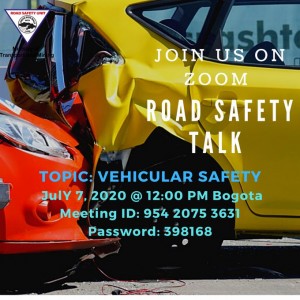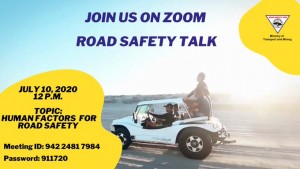
Road Safety Matters: Is Your Vehicle Safe?
July 9th, 2020
“We enter this world without spare parts!”
Director of the Road Safety Unit at the Ministry of Transport and Mining, Mr. Kenute Hare, has a marvelous way with words. He was presenting the second in a series of webinars on road safety, focusing on safe vehicles (which do have spare parts, unlike humans). The event was very well attended, not only by Jamaicans but by “Zoomers” from the United States, Chile, Ghana and Kenya. The Africans’ comments were particularly interesting.
Yesterday’s webinar focused on the vehicles. Although a tremendous amount of information was conveyed by Mr. Hare, it seemed there was always more to be learned and discussed.
We are currently in the United Nations Decade of Action for Road Safety. The decade has five basic goals or pillars: Road safety management; Safer roads and mobility; Safe vehicles; Road user behavior; and Post-crash care. Let’s stick a pin here for a moment.
Mr. Hare pointed out that there is much more to be addressed in Jamaica than these five basic areas. There is a need for greater research, leading to planning, policy-making and action plans (with targets, wherever possible); not only in government but also the private sector. In my view, it should not be left up to the service clubs to worry about road safety. As has been noted before, greater collaboration across different sectors is essential. Road safety is not only about transportation, obviously; it’s about human lives and health, crime and security, and every road crash incurs a cost. Several government agencies get involved (and of course the insurance sector). The Jamaica Fire Brigade and law enforcement agencies are integrally involved. So there’s the need for much more of that “holistic approach.”
Most of all, perhaps, there is the need for strong political will. Despite a number of campaigns, speeches and awareness-raising events, last year deaths on the road sky-rocketed to 435 human lives lost – nearly breaking an all-time record. But it’s not just the politicians that need to get engaged; public-private sector partnerships need to be strengthened, targeted and meaningful.
I have noted that UNICEF Jamaica has an upcoming campaign focused on children’s safety on the roads. This is the kind of approach that is required.
I think that perhaps the public aren’t engaged on the issue because getting killed or injured in a car crash is “something that happens to other people” and their families. Not to me. Not to us. We need to find strong advocates (especially youth) who have been injured or personally impacted by the carnage on the roads. The issue needs to hit home, hard. Speeches and social media campaigns are not enough. A car crash takes just one second to happen – out of the blue.
There are three aspects of a crash: The vehicle hitting something, the human being inside hitting something (sometimes, each other), and the internal injuries that can occur when our organs and our bones collide with each other inside our bodies. I had never thought of this awful scenario. Also, things that are in the car – a water bottle, a phone – will also turn into missiles and fly around. All this happens at the same speed that the vehicle is moving at. Which can often be quite fast.
Let’s talk about seatbelts. How many times must Mr. Hare remind us? Wear your seatbelt at all times – both front and back seat passengers (and if you are riding on a bus – hopefully it will have seat belts). I myself know of a tragic case years ago when a back seat passenger not wearing a seat belt was killed in a crash – she was thrown to the front. The other occupants of the car were not badly hurt. If you don’t wear your seat belt, you can also be thrown right out of the car, with disastrous consequences.
Seat belts are one of the “passive” safety features in a vehicle. You can get them replaced if necessary. Others are front driver and passenger airbags; head protecting side airbags; head restraints (don’t remove them!); fuel pump shut-off devices; and side impact bars. “Active” safety features include anti-lock braking systems; turn signals; and high performance tyres. Four wheel drives lessen the chances of wheel spin; and things like a dynamic steering response and traction control. And also, that feature that beeps when you are reversing to let you know that you are about to bump into something.
A safe car must have a strong roof, powerful windscreen wipers, directional headlights, and “crumple zones” too. There are special systems like lane departure warnings and autonomous cruise control, all of which will allow you to drive more safely, but some of these features may be in the more pricey vehicles.
Air bags activate very, very fast. As such, they can be dangerous for children sitting in the front. So, make sure your kids are in the back of the car, with seat belts or child restraints.
There was a lot more discussion about speeding – and tyres. Did you know that you can check the expiration date of your tyre by checking the four numbers stamped on the side of it? Tyres expire four years after the date of manufacture.
This may all seem very technical, and there is so much to learn. But paying attention to even one of these details can save a life – or lives.
More about speeding next time. As Mr. Hare put it: “For the most part, human beings think they are invincible.”
Doesn’t that remind you of a certain pandemic?
Follow the Road Safety Unit on Twitter @RoadSafetyJA
Tags: children, Ghana, Jamaica Constabulary Force, Jamaica Fire Brigade, Kenute Hare, Kenya, Ministry of Transport and Mining, road accidents, road safety, Road Safety Unit, seatbelt, UNICEF Jamaica, United Nations, United States
The Gleaner reserves the right not to publish comments that may be deemed libelous, derogatory or indecent.
To respond to The Gleaner please use the feedback form.
2 Responses to “Road Safety Matters: Is Your Vehicle Safe?”
- We Are the Zoomers
- Living Online with Humans and Birds: NAOC 2020
- Human Trafficking and the Problem of Public Education
- Down Memory Lane
- Are We Ready to Recover from COVID-19?
- Road Safety Matters: Is Your Vehicle Safe?
- Sexual Harassment, Me Too, and the Minister’s Disturbing Giggle
- The Vulnerable Senior Citizens, Private Care Homes and COVID-19
- A Muddle Over Masks
- Here is Something Life-Saving You Can Do: Give Blood!





Safe driving instead of safe driving
[…] who heads the Road Safety Unit at the Ministry of Transport, has been doing a grand job hosting a series of online discussions on many aspects of road safety in the past few […]